- Home
- Neal Shusterman
The Shadow Club Rising Page 9
The Shadow Club Rising Read online
Page 9
I pushed my way through crowds, knocking over kids in my way. The sound of crashing trays gained everyone's attention, but I couldn't worry about that now. Weaving between tables and leaping over chairs like a hurdler, I finally reached him. I tried to slow down, but lost my balance, nailing my gut against the side of the table. Alec had his head tilted back guzzling the orange soda, and I reached out and slammed it out of his hands.
"Hey, what the . . ."
It splashed all over the kids around him before landing on the floor, spilling out on the green linoleum.
"Are you nuts?" Alec yelled. "Have you totally lost your mind?"
I didn't have time for stupid questions. "Was it flat?" I asked.
"Huh?"
"The soda—was it flat when you opened it?"
He just looked at me blankly, so I got down on my hands and knees, running my fingers through the sticky orange liquid. I wasn't sure what I was searching for . . . maybe undissolved granules within the soda that fizzed between myfingers.
I grabbed for the bottle that still spun on the floor. Nothing inside but a few drops of soda. I drank it. It tasted normal, untainted. I took a deep and welcomed breath of relief.
When I looked up, about a dozen kids were staring down in me. For a moment I locked eyes with Austin Pace, who was now a part of Alec's entourage. What's that old expression? My enemy's enemy is my friend? The two of them must have been getting along famously.
"He's insane!" said Austin. "He's gone completely off the deep end!"
"I don't think he was all there to begin with," said Alec.
My camouflage pants had now absorbed enough of the soda to be orange from the knees down, and my hands were still dripping the stuff. I came to the sudden realization that in my entire life I had never looked quite so stupid. I wished I could have been anywhere else in the world right then.
"Are you having fun?" Alec asked.
I stood up, trying to avoid eye contact with the kids around me, and reached into my pocket, pulling out a crumpled dollar bill. "Sorry," I said, handing him the dollar. "Buy yourself a new soda."
He threw the bill back at me. "I don't want your stupid money. I want to know what this is all about."
I opened my mouth to tell him, but quickly shut it again. I had overreacted—I knew that now. I had drawn the wrong conclusion from that medical report, and I looked silly enough without trying to explain the details of my stupidity. "I just thought there was something wrong with your soda, that's all."
"I don't like your mind games, Mercer."
"Yeah, get lost," said Austin.
"Yeah," echoed Brett Whatley, who stood with his arms crossed, trying to fill his role as bodyguard. Alec sat back down, dismissing me like a fly he had swatted away. "Better clean that up," he said, chowing down on his chili. But getting back down on all fours again was an indignity I wasn't going to endure. I turned, fully prepared to make my escape from this painful situation . . . until I heard something that stopped me dead in my tracks.
"Ugh!" Alex said. "What do they make this chili out of, anyway? Cigarette butts and coffee grounds?"
I turned back to see Moose take a taste of his own chili. "Mine tastes fine."
Alec took a second spoonful. "Barely edible," he said.
I moved toward them again, and this time dipped my finger into his chili, and tasted it.
Moose got up, ready to hurl me through the wall like a nightclub bouncer. But Moose was the least of my concerns now . . . because Alec's chili had a distinctly bitter, chalky taste . . .
"Alec, how allergic are you to penicillin?"
Suddenly he began to take me far more seriously than he had a moment before. "Why?"
But I already could tell that he was starting to feel uncomfortable, as though he had a slight fever coming on. His face was beginning to flush.
"We've got to get you out of here! We've got to get you to the nurse's office!"
I could see in his face the moment that it clicked. His eyes were panicked and accusing.
"What did you do?"
There wasn't time to explain. His lips were beginning to get puffy. I knew what an allergic reaction was like. I was allergic to bees. I had been stung three times in my life, and each time my reaction got worse. Now they were more dangerous for me than a rattlesnake or black widow spider bite. There was an adrenaline injector in the office with my name on it. I didn't know if a shot of adrenaline worked on penicillin the way it worked on bee stings, but the nurse would have to know.
Alec began to walk toward the cafeteria door, his eyes swelling in tears of fear. He wasn't walking fast enough, so I grabbed his arm and pulled him. He didn't shake me off—he let me part the gawking onlookers, who were probably wondering what on earth that maniac Jared Mercer was up to.
By the time we got to the office, Alec's face was blotchy and he looked as though someone was slowly pumping him up with air. It wouldn't be long before his whole body became one huge, red, swollen hive. I could feel him quivering as I pulled him past the counter toward the nurse's office.
"You're not allowed back here," said the school secretary,
Ignoring her, we burst into the nurse's office, and miraculously, the nurse was actually there, in the middle of lunch. She looked up with linguini hanging out of her mouth.
"Allergic reaction!" I shouted. "Penicillin."
"My God." She was quick to react. She called out to the secretary to dial 911, and Alec settled into a chair, his knees shaky. I wasn't sure whether that was part of the reaction, or just his fear. "How much did he ingest? How long ago."
"A lot—just now. You need an adrenaline injector? Mine's here, somewhere."
I tried to find it, but ended up knocking over a shelf full of medical stuff.
"Go talk to the emergency operator. Tell them what you told me." Then she pushed me out the door.
It didn't take very long for word of this to get around school. Just about everyone knew about the "incident" by the time the ambulance arrived and took Alec away.
"Everyone knows you did it," taunted Brett Whatley, who sat behind me in science. "Just because you chickened out at the last moment and tried to stop it doesn't mean you're not guilty." And I knew the whole school felt the same way. After all, who else but the person who did it could have known that his food was spiked with penicillin? And me, with my new set of clothes, and attitude—how could they draw any other conclusion? I couldn't find O. P. to get me off the hook with the note she had gotten, and I figured she was too scared to get anywhere near this now.
I kept looking around to see if there was anyone fidgeting—someone feeling the weight of the guilt for what they had done, or someone irritated that I got all the credit. I had compiled about fifteen possible suspects in my notebook. Half of them I had already crossed off, of the other half I was still uncertain.
There was nothing to do but run. I didn't want to talk to anybody, I didn't want to see anybody, and although I didn't want to be alone with my own thoughts either, I figured by running I could outdistance them a little bit. If I could focus my attention on the pounding of my feet and the rhythm of my breathing, maybe I could stop thinking for a few minutes. I cut class, ditching a math test, and took to the streets. I didn't know where I was going and didn't follow my usual path, I just ran. I ran down Pine Street, where there was nothing but winter-dead sycamores. I ran past Solerno's, empty at this off-hour of the afternoon. I ran to the marina toward the Ghosties, but didn't want to go into that old boat graveyard, so I turned around and doubled back, taking the road that wound around the jagged shoreline. I just kept weaving, for what seemed like hours.
I could take a lie-detector test, I thought, and prove to them I was telling the truth. But I had to face the fact that nothing I said would prove anything, because people beat lie-detector tests. Sociopaths could lie without a blip, so it wouldn't prove my innocence, it would only confirm what Greene already thought he knew about me. I began to wonder why we were made so people c
ouldn't get into your head. Outside of your own thoughts, there was no such thing as truth, only what other people thought was true.
I was so wrapped up in my own thoughts I didn't even notice the car pulling up beside me, until the window rolled down and I heard the driver's voice.
"Get in."
It was so flat, so void of any familiar emotion, I didn't recognize it at first. I turned sharply, almost stumbling, and saw my father. I heard the power locks pop up. "Get in," he said again.
I stopped running, and the car slowed to a stop a few yards ahead of me. For a moment I considered turning around and running off in the other direction. I could ditch into the woods—he wouldn't be able to follow me then. And then I thought, How long has he been driving through town, looking for me? Our town is pretty big—the thought of my father driving for hours until finding me made me move toward the car, pull open the door, and get in.
I sat in the passenger seat without looking at him, closed the door, and we drove off. He started to wind through the outskirts of town, making turns without using his signal. It scared me, because my father wears a seat belt, goes the speed limit, and he always, always signals. His life is all safety and stability. That's probably why he got into selling homeowners' insurance. Everything has to be protected. He took the business with the Shadow Club pretty hard last October. I guess it drove him nuts that he couldn't protect me from me.
"Your mother and I have been called in to see your principal tomorrow," he finally said. "But I'm sure you already know that."
"I can explain—"
"BE QUIET!" he shouted. It caught me completely by surprise. He had raised his voice to me before, but never so suddenly—never with such rage behind his words. For an instant I thought he might hit me, even though he had never hit me before. "You are not here to talk, you are here to listen. Do you understand me?"
I nodded. "Yes, sir." I couldn't remember ever calling him "sir" before.
"Your mother and I know about what's been happening to that Alec kid. We know about the incident today, too."
I opened my mouth to say something, but he threw me a sharp gaze and I closed it again.
"The school is going to try to expel you—you know that, don't you? They might even bring you up on charges."
Although I hadn't wanted to think about it, yes, I knew.
"I want you to tell me what evidence they have that it was you."
I considered the question carefully. "Nothing, really. I mean, there was this button from my shirt on Alec's driveway, but I didn't put it—"
"Circumstantial," he said. "Is that all?"
"That, and the fact that I knew about the penicillin."
He weighed the thought. "Well, then, they don't have much of a case."
There was something off about this—something not just in the tone of his voice, but the pattern of his thoughts.
"If there are any witnesses," he said, "it will be your word against theirs."
The heater in the car was on full blast, but I shivered all the same. He thinks I did it. It wasn't just Greene, or the other kids at school. My father thought that I was the kind of kid who would spike an allergic kid's chili with penicillin. Tears welled up in my eyes. I didn't even think about holding them back, but I did turn away from him, for fear that he'd think they were tears of guilt.
"There are lawyers who specialize in this sort of thing," he went on. "They can't expel you—you're innocent until proven guilty, no matter what you've done."
"No matter what I've done?" I turned to him, my vision mercifully blurred, so I didn't have to see the way he looked at me. "Dad, how can you talk like this?"
Then his jaw hardened, and I could sense that rage inside him again, but also an intense sadness. Tears being contagious in my family, his eyes began to fill. "We're talking about your future here, Jared. We're talking about your life. You want to save it, you tell them you're innocent, and you stick to it like glue to the very end."
"But I am innocent."
He took a long look at me then. So long that I had to remind him to look back at the road. He hit the brakes, and his trusty antilock brake system ground us to a halt halfway through an empty intersection. He backed up and waited for the light to change.
"I didn't do any of those things," I said, trying so hard to be sincere, it sounded like a lie. "You know that, Dad, don't you? . . . Don't you?"
He sighed and nodded reluctantly. I couldn't tell whether he believed me, or whether he was just showing his approval for an earnest lie.
"Well," he said, "all the more reason to tough it out."
If anyone could sleep after a drive like that, he's a better man than me. I lay awake that night, my head caught in endless loops of conversations that I'd never have. All the things I could have said to my father that would have convinced him I was telling the truth. All the things I could say to Alec, to make him turn his investigation—and his hatred elsewhere. Then I started thinking about what would happen if Alec's allergic reaction was much worse than anyone thought. What if he didn't make it? What if he died because some stupid idiot poisoned his chili, and what if the whole world was convinced it was me? That's the type of thing they put on the news. The type of thing they put on the cover of a hundred magazines to show how very screwed up some kids are, and isn't it terrible, and isn't it all because of TV and movies and Barney the dinosaur, and parents who sell insurance And then they turn off their TVs, and throw away the magazine, and go on with their lives, thinking everything is so simple. Except it's not. Because if your own parents can't see into your head and know that there's someone in there who might not be all that innocent, but at least is innocent most of the time . . . if my own parents can't see what's always been good in me, then nothing can ever be simple again.
Fire
With Fire
ALEC DIDN'T DIE that day. In fact, he didn't even have to spend the night at the hospital. They pumped his stomach, shot him up with adrenaline, and gave him a Benadryl IV. He was home before dark.
Regardless of Alec's recovery, it was like a funeral when my parents drove me to school the next day for their meeting with the principal. Valentine's Day. Not much love went around today—in fact, my father said only one thing to me that morning. When I came out of my room, he took one look at me and said, "Change your clothes."
I looked at myself, realizing I was wearing my "bad" clothes. I had put them on without thinking. I changed silently into slacks and a plain shirt. One that had no missing buttons.
When we arrived, we suffered the indignation of sitting in the main office, in full view of everyone who passed by, until finally, ten minutes into first period, Principal Diller called us in. Only he didn't call all of us in. He had my parents go into his office. Me, he sent down the hall, to see Mr. Greene. Divide and conquer. I had learned about it in social studies.
A student escorted me to Mr. Greene's office. I recognized her as the girl from the chess team. The one who suggested that I teach Alec a lesson.
"For what it's worth, I think it was an excellent trick," she said to me.
I felt like lifting her up by her pigtails and screaming into her face. Instead I just said, "What if he died?"
She shook her head. "People don't die from allergic reactions. I'm allergic to cats, and it never killed me."
"Ever swallow a cat?" I asked. "Try it sometime, and we'll see if the allergic reaction kills you."
Mr. Greene was pacing outside of his office, waiting for me. Those last steps up to him felt like the thirteen steps up to the gallows, and no amount of denials would get me out of this.
"Good morning, Jared," Greene said as I approached him there in the hallway. "I suppose you know why you are here?"
There was no smug cockiness in his tone. Instead it was dead serious, and that was scary.
"How's Alec?" I asked.
"He's home today. We hope he'll be back by Friday." I took a deep, much needed breath of relief. "Understandably," said Mr. Greene, "his
parents want to bring whoever did this up on criminal charges."
And one last time I looked Greene straight in the face. No attitude, no defenses, just the honest truth.
"I didn't do this, Mr. Greene."
And Mr. Greene said, "I know you didn't, Jared." Then he swung open the door to his office to reveal it was already full of people. Faces I knew—the Shadow Club.
I stepped in, wondering at first if I was the victim of some practical joke myself. The looks on everyone's faces made it clear that I wasn't. They were as scared, and worried as I was. Darren, Jason, O. P.—all of them, even Cheryl.
"They all came to my office right after school yesterday," Mr. Greene explained, "O. P. showed me this." He pulled from his desk the medical form O. P. had shown me, with the note on the back. "We're on your side."
"I told him why you were wearing that hat," Darren said. "Why you've been dressing that way. Going undercover and all."
"I told him exactly what happened at that meeting," said Jason.
"I didn't believe them at first," said Greene.
"Yeah," said Randall, "he thought it was some trick the Shadow Club had worked out to get ourselves off the hook."
"So what changed your mind?" I asked.
"I did," said a voice that I wasn't expecting to hear. As I moved deeper into the office, I saw that someone was sitting in the Electric Chair. Not a member of the Shadow Club, not even close—it was Austin Pace.
"Why don't the rest of you get back to class," Mr. Greene said.
The Shadow Club filed out and left me alone with Austin and Mr. Greene.
"It was you, Austin?" I said incredulously. "You pulled all those pranks? You poisoned Alec's lunch?"
Mr. Greene answered for him.
"No," Mr. Greene said, "but what he did wasn't much better."
Austin wouldn't look at me. Mr. Greene had to prompt him. "Why don't you tell him, Austin."
I sat down in one of the softer chairs reserved for kids who needed kindness instead of discipline.
"I put your button on Alec's driveway."

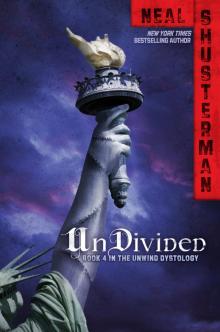 UnDivided
UnDivided UnBound
UnBound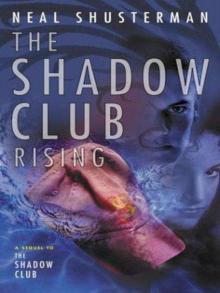 The Shadow Club Rising
The Shadow Club Rising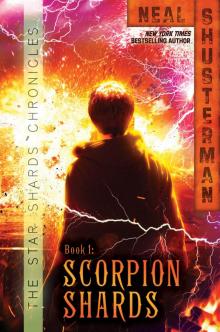 Scorpion Shards
Scorpion Shards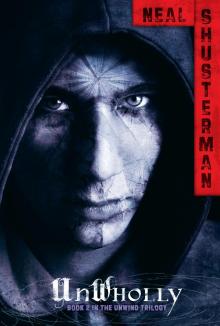 UnWholly
UnWholly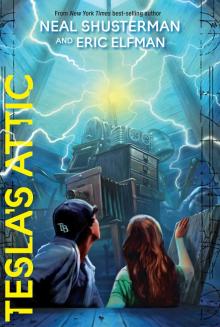 Tesla's Attic
Tesla's Attic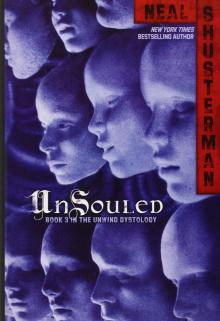 UnSouled
UnSouled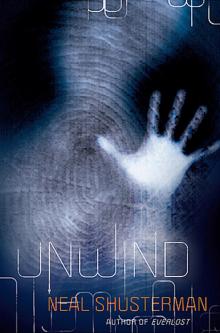 Unwind
Unwind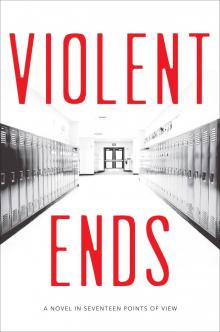 Violent Ends
Violent Ends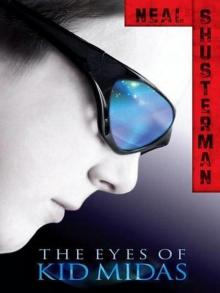 The Eyes of Kid Midas
The Eyes of Kid Midas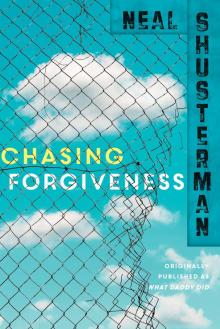 Chasing Forgiveness
Chasing Forgiveness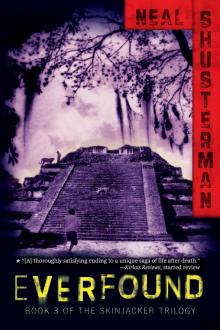 Everfound
Everfound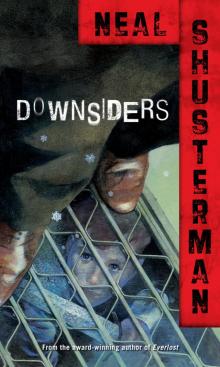 Downsiders
Downsiders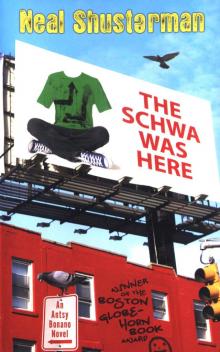 The Schwa Was Here
The Schwa Was Here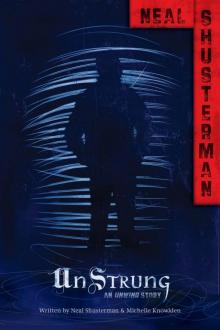 UnStrung
UnStrung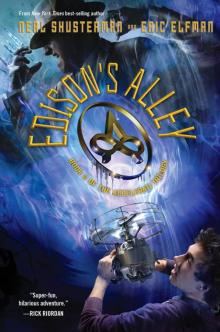 Edison's Alley
Edison's Alley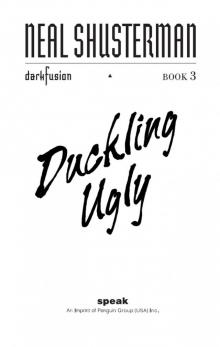 Duckling Ugly
Duckling Ugly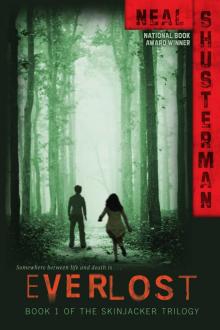 Everlost
Everlost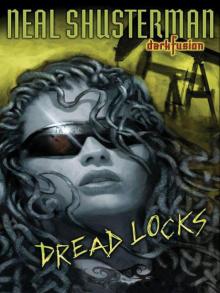 Dread Locks
Dread Locks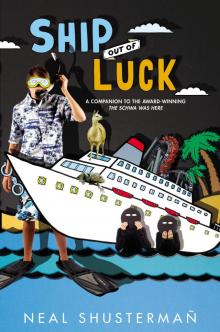 Antsy Floats
Antsy Floats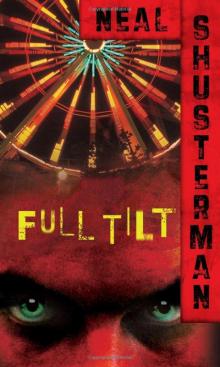 Full Tilt
Full Tilt Thunderhead
Thunderhead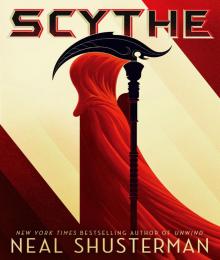 Scythe
Scythe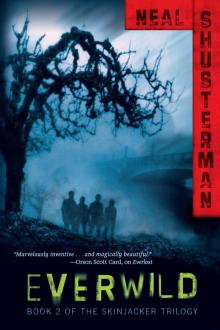 Everwild
Everwild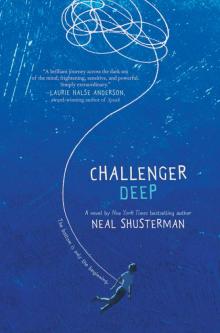 Challenger Deep
Challenger Deep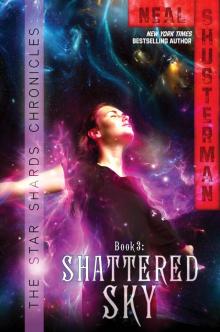 Shattered Sky
Shattered Sky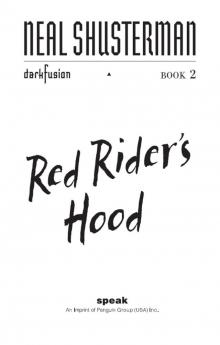 Red Rider's Hood
Red Rider's Hood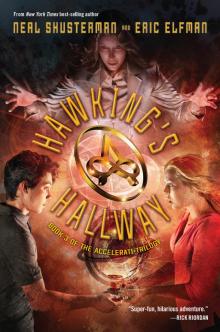 Hawking's Hallway
Hawking's Hallway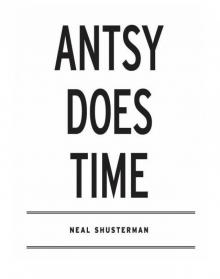 Antsy Does Time
Antsy Does Time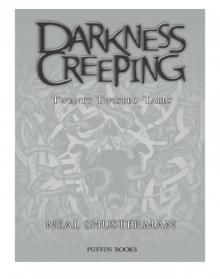 Darkness Creeping: Twenty Twisted Tales
Darkness Creeping: Twenty Twisted Tales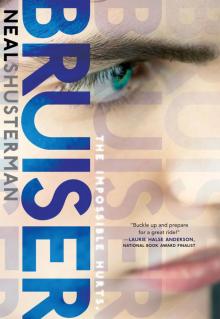 Bruiser
Bruiser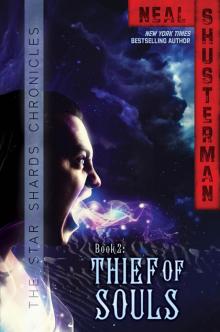 Thief of Souls
Thief of Souls The Toll
The Toll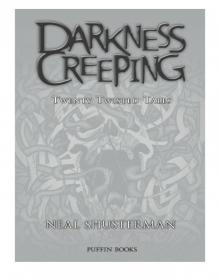 Darkness Creeping
Darkness Creeping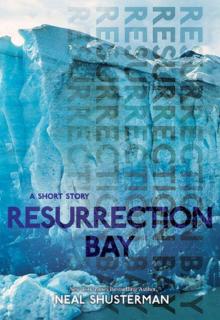 Resurrection Bay
Resurrection Bay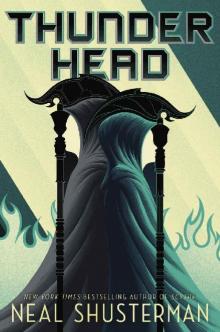 Thunderhead (Arc of a Scythe Book 2)
Thunderhead (Arc of a Scythe Book 2)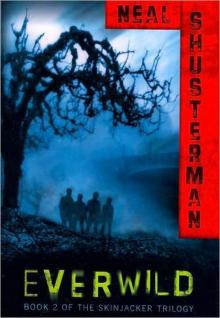 Everwild (The Skinjacker Trilogy)
Everwild (The Skinjacker Trilogy)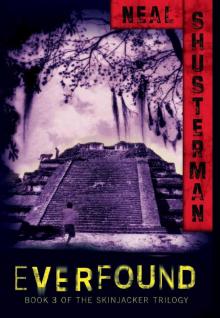 Everfound s-3
Everfound s-3 Edison’s Alley
Edison’s Alley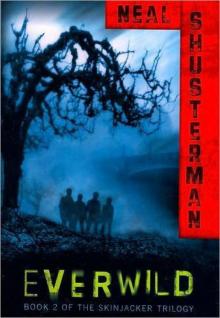 Everwild s-2
Everwild s-2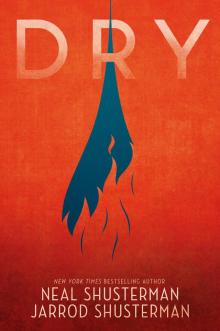 Dry
Dry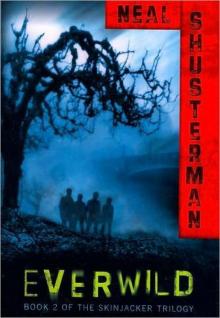 Skinjacker 02 Everwild
Skinjacker 02 Everwild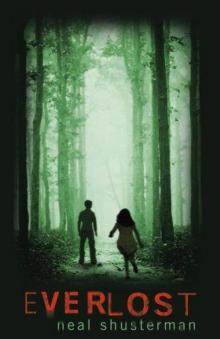 Everlost s-1
Everlost s-1